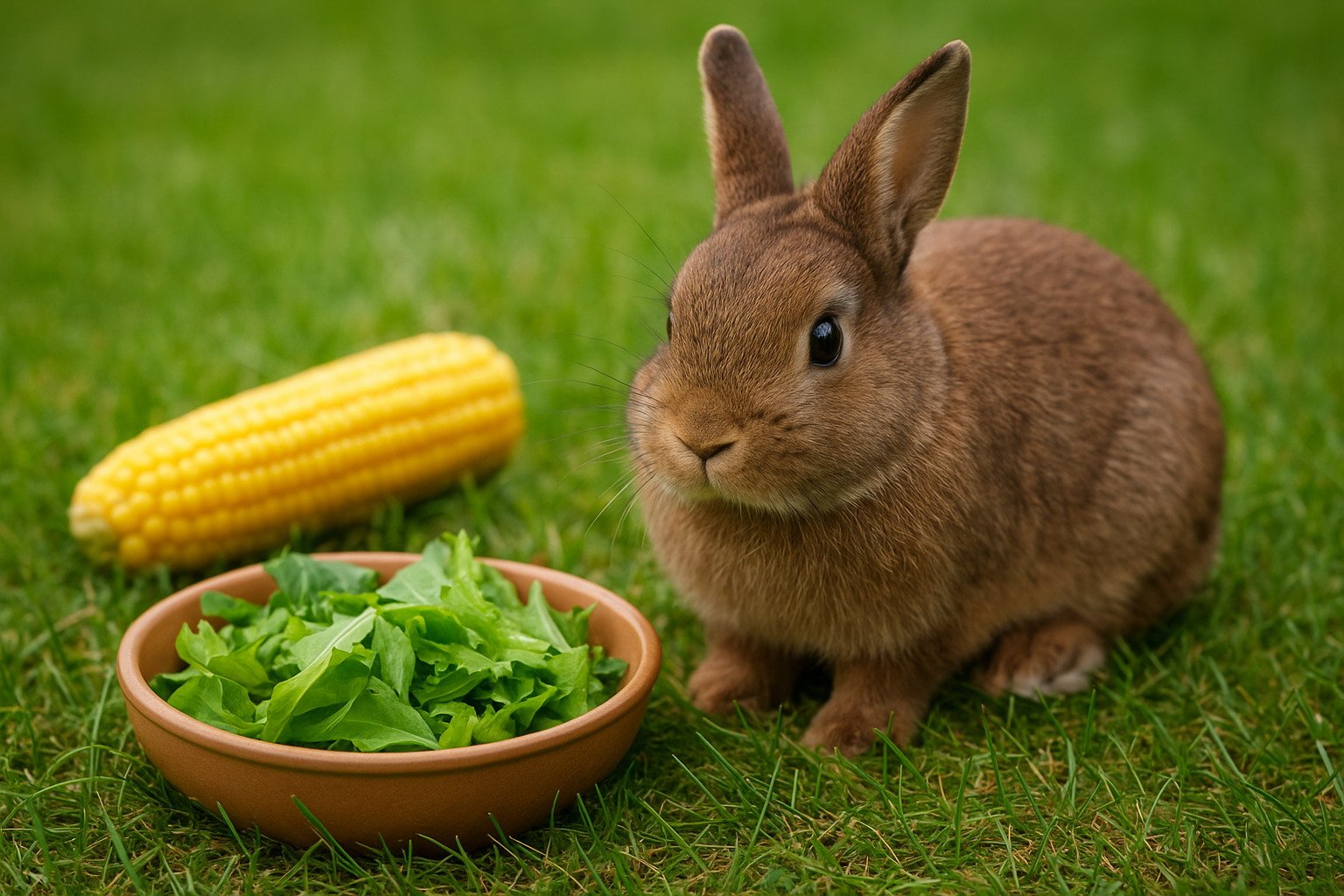Rabbits are curious eaters, and many owners wonder if they can share human foods like cooked sweetcorn with their furry companions. At first glance, sweetcorn might seem harmless—after all, it’s a vegetable, right? However, rabbits have very different nutritional needs compared to humans, and feeding them the wrong foods can quickly lead to health issues.
In this article, we’ll take a close look at whether rabbits can eat cooked sweetcorn, how it affects their health, and safer alternatives that keep them thriving.
In This Article
Rabbits and Cooked Sweetcorn
Pet rabbits depend on a very specific diet to maintain good digestion and dental health. Unlike omnivores such as humans or dogs, rabbits are strict herbivores designed to consume high-fiber, low-sugar foods. Their diet should be built around hay, leafy greens, and fresh water, with only small amounts of vegetables or fruit as occasional treats.
Despite this, many rabbit owners are tempted to share table scraps—especially cooked vegetables like sweetcorn. The golden kernels may look like a tasty snack, but what’s safe for humans is not always safe for bunnies. Understanding the difference is crucial to avoid serious digestive upsets.
Understanding a Rabbit’s Natural Diet
To fully grasp why cooked sweetcorn is a questionable choice for rabbits, it’s important to understand what rabbits are meant to eat in the wild and at home.
What Wild Rabbits Eat
- Grasses and wild plants
- Leaves, stems, and twigs
- Occasional herbs and wildflowers
This natural diet is rich in fiber, which helps wear down constantly growing teeth and keeps their gut working smoothly.
The Domestic Rabbit’s Diet
A healthy pet rabbit diet should look like this:
| Food Type | Percentage of Diet | Examples |
| Hay (main food source) | 80–85% | Timothy, orchard grass, meadow hay |
| Fresh leafy greens | 10–15% | Kale, romaine, parsley, dandelion |
| Vegetables & herbs | 5–10% | Carrot tops, basil, cilantro |
| Pellets (optional) | Small portion | High-fiber, no added sugar |
| Treats (fruit/veg) | Very small amount | Apple slices, berries, carrot |
Anything outside of this balance—especially cooked or processed foods—puts stress on their digestive system.
What is Cooked Sweetcorn?
Sweetcorn, whether grilled, boiled, or steamed, is a starchy vegetable high in natural sugars and carbohydrates. Cooking changes its texture, breaks down some nutrients, and makes it easier for humans to digest. However, rabbits are not built to handle cooked or processed food at all.
Nutritional Profile of Cooked Sweetcorn (per 100g)
- Calories: 96 kcal
- Carbohydrates: 21 g
- Sugar: 6.3 g
- Fiber: 2.4 g
- Protein: 3.4 g
At first glance, this seems fairly healthy, but for rabbits, these numbers tell a different story. The low fiber and high sugar content are the opposite of what their bodies require. Rabbits thrive on indigestible fiber, not on starchy carbs.
Cooking further alters corn by softening the kernel shells, which may seem safer for chewing, but actually makes digestion harder for a rabbit’s sensitive gut.
Can Rabbits Eat Cooked Sweetcorn Safely?
The short and simple answer is no, rabbits should not eat cooked sweetcorn. While it might seem harmless to offer a small piece, cooked corn is not suitable for their delicate digestive system.
Rabbits rely on food that is high in fiber and low in starch and sugar, but cooked sweetcorn is the opposite. The high carbohydrate content can cause an imbalance in their gut bacteria, which may lead to bloating, diarrhea, or even gastrointestinal (GI) stasis—a potentially fatal condition where the digestive system slows down or stops.
Another concern is that cooking removes some of the natural fiber in corn. Since fiber is the foundation of a rabbit’s diet, replacing it with a low-fiber food like cooked corn can quickly cause health problems.
Expert Tip: Even small amounts of cooked sweetcorn should be avoided. Rabbits do not benefit from cooked or processed food in any form.
Health Risks of Feeding Rabbits Cooked Sweetcorn
Feeding cooked sweetcorn to rabbits may lead to several health issues. Here are the main risks:
Digestive Problems
- Bloating and gas due to excess starch fermenting in the gut.
- Diarrhea because their system struggles to process the sugars.
- GI stasis, which can be life-threatening if not treated quickly.
Weight Gain and Obesity
- High in calories compared to leafy greens.
- Extra sugar can easily lead to fat storage, reducing overall activity and mobility.
Dental Concerns
- Rabbits need fibrous foods to grind down their constantly growing teeth.
- Cooked corn is soft and offers no dental benefits, increasing the risk of overgrown teeth.
Choking Hazard
- Corn kernels can get stuck in a rabbit’s throat, especially when cooked and softened into sticky pieces.
Why Raw or Cooked Sweetcorn is Different from Rabbit-Safe Vegetables
It’s easy to assume all vegetables are good for rabbits, but not all veggies are created equal. Sweetcorn, whether raw or cooked, is starchy and sugary, unlike leafy greens or fibrous stems that rabbits are designed to eat.
Here’s a quick comparison:
| Food Type | Fiber Content | Sugar Content | Safe for Rabbits? |
| Cooked Sweetcorn | Low (2.4 g) | High (6.3 g) | ❌ No |
| Romaine Lettuce | High (2.1 g) | Very Low (0.5 g) | ✅ Yes |
| Dandelion Greens | Very High | Negligible | ✅ Yes |
| Carrots (small piece) | Moderate | High (4.7 g) | ⚠️ Occasionally |
As the table shows, sweetcorn offers the wrong nutritional balance. Unlike fibrous greens, it does not help digestion or dental health. Instead, it loads rabbits with sugar and starch that their bodies can’t properly process.
Think of cooked sweetcorn like junk food for rabbits—tempting, but harmful in the long run.
Signs of Problems if a Rabbit Eats Cooked Sweetcorn
If your rabbit accidentally nibbles on cooked sweetcorn, you’ll need to keep a close eye on their behavior and droppings. Rabbits hide pain very well, so subtle changes can be the first warning signs of trouble.
Symptoms to Watch For:
- Reduced appetite or refusal to eat hay
- Smaller or fewer droppings (a sign of digestive slowdown)
- Diarrhea or mushy stools
- Bloating or abdominal discomfort (rabbit may sit hunched or grind teeth)
- Lethargy and lack of interest in normal activity
If you notice any of these signs after your rabbit eats cooked sweetcorn, contact a rabbit-savvy veterinarian immediately. GI stasis and blockages can become life-threatening within 24 hours if untreated.
Better Alternatives to Cooked Sweetcorn for Rabbits
Instead of offering unsafe foods like cooked sweetcorn, focus on safe and nutritious alternatives that rabbits love and thrive on.
Safe Vegetables for Rabbits
- Leafy greens: kale, romaine, spring greens, bok choy
- Herbs: basil, cilantro, mint, parsley, dill
- Other safe veggies (small amounts): bell peppers, zucchini, broccoli leaves, carrot tops
Occasional Treats (in moderation)
- Small pieces of carrot
- Thin slices of apple or pear (without seeds)
- A couple of blueberries or strawberries
Case Study: A rabbit owner once replaced daily corn treats with fresh parsley and romaine lettuce. Within weeks, the rabbit showed better energy levels, healthier droppings, and improved dental condition thanks to the fiber boost.
By sticking to rabbit-friendly vegetables, you’ll support their digestion, teeth, and overall well-being without the risks that come with starchy foods like corn.
What to Do if Your Rabbit Accidentally Eats Cooked Sweetcorn
Accidents happen—maybe a rabbit steals food from a plate or you unknowingly offered a small piece. If that happens, don’t panic, but take the right steps.
Immediate Actions:
- Remove any remaining sweetcorn from their reach.
- Encourage hay eating to keep their digestive system moving.
- Provide plenty of fresh water to help flush their gut.
Monitor Closely For 24–48 Hours:
- Are they eating and drinking normally?
- Are droppings the usual size and shape?
- Is the rabbit active, grooming, and behaving normally?
When to Call a Vet:
- If your rabbit stops eating or drinking
- If droppings decrease in size or stop completely
- If you notice bloating, diarrhea, or lethargy
Quote from a veterinarian (House Rabbit Society):
“A rabbit’s digestive system is extremely delicate. Foods like corn, bread, or cereals can trigger dangerous blockages and should never be included in their diet.”
Expert Opinions on Rabbits and Cooked Sweetcorn
Veterinary experts and rabbit care organizations consistently warn against feeding corn—raw or cooked—to rabbits. The House Rabbit Society, one of the leading authorities on rabbit care, clearly states that corn should never be fed to rabbits due to its indigestibility and risk of causing gastrointestinal issues.
Veterinarians also point out that while sweetcorn might look like a vegetable, it behaves more like a grain in terms of nutrition. Its starchy, sugary nature makes it unsuitable for rabbit digestion. Unlike humans, rabbits cannot break down complex starches effectively, which is why foods like bread, pasta, or corn should always be avoided.
“Cooked sweetcorn may seem like a harmless treat, but for rabbits it poses a serious health risk. Their bodies are designed for hay and greens, not starchy vegetables.” — Dr. Sarah Miller, Exotic Pet Veterinarian
The overwhelming consensus from experts is clear: cooked sweetcorn is not safe for rabbits in any amount.
Frequently Asked Questions (FAQs)
Can rabbits eat raw sweetcorn?
No. Raw corn is just as dangerous as cooked corn. Its kernels are hard to digest, and the starch can lead to bloating and digestive blockages.
Can rabbits eat corn husks or leaves?
While husks and corn leaves are more fibrous than the kernels, they are still not recommended. Some husks can be tough and stringy, increasing the risk of choking or intestinal blockage.
Why do rabbits seem interested in sweet foods like corn?
Rabbits have a natural attraction to sugary foods because, in the wild, sweet plants are rare and energy-rich. However, domesticated rabbits live longer and are prone to obesity and gut problems if sugary foods are given regularly. Their instincts don’t always align with what’s safe for them.
What happens if my rabbit ate a small piece of cooked sweetcorn?
One small nibble is unlikely to be fatal, but you should watch your rabbit closely for the next 24–48 hours. If you notice reduced appetite, small or no droppings, or lethargy, seek veterinary help immediately.
Conclusion: Should Rabbits Eat Cooked Sweetcorn?
So, can rabbits eat cooked sweetcorn? The answer is a firm no. Cooked sweetcorn is too starchy, too sugary, and too low in fiber for a rabbit’s unique digestive system. Even small amounts can upset their gut and, in severe cases, lead to life-threatening conditions like GI stasis.
Rabbits thrive on a diet built around unlimited hay, leafy greens, and fresh water, with only occasional healthy treats. By avoiding foods like cooked sweetcorn and sticking to rabbit-safe vegetables, you’re ensuring a longer, healthier, and happier life for your furry friend.
Think of it this way: hay is a rabbit’s superfood, while cooked sweetcorn is junk food. Always choose the superfood.

